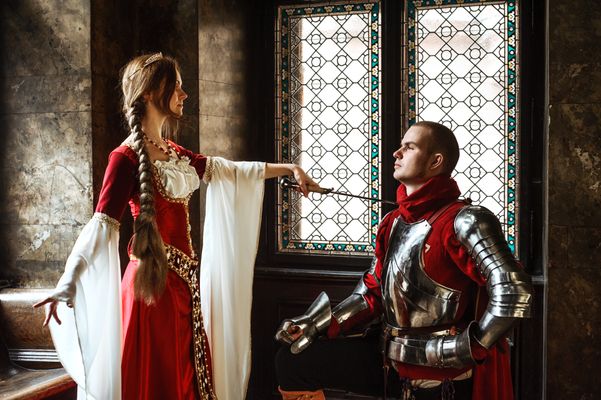8.1.3
Gender
Gender
Gender
Shakespeare predominantly wrote during the reign of Queen Elizabeth I, a famously strong female in a patriarchal society, much like Beatrice.


Queen Elizabeth I
Queen Elizabeth I
- Queen Elizabeth I reigned for most of Shakespeare’s life as a playwright and famously never married.
- As she approached the end of her reign at the time Much Ado About Nothing, perhaps there are some parallels between ‘The Virgin Queen’ and Beatrice who at the start of the play vows never to marry?


Messina
Messina
- Despite the success of Elizabeth I’s reign, the society of Messina is clearly one dominated by men.
- Antonio tells Beatrice she will never find a husband if she doesn’t calm her headstrong, independent nature.
- He describes her as being “shrew’d of tongue”.
- Calling Beatrice ‘shrewish’ may relate to one of Shakespeare’s earlier plays The Taming of the Shrew (c. 1590 - 92).


Silence
Silence
- Accepting Benedick’s love for her, Beatrice states she will “tame her wild heart”.
- A modern (feminist) audience may question whether this is an appropriate action for such a radical, outspoken female character.
- Does her silence at the end of the play illustrate her taming or is it rather a silent contentment, much like Claudio in Act 2, Scene 1 (“silence is the perfectest herald of joy”).


Hero
Hero
- Hero is a character who highlights the key differences between the genders in her interactions with male and female characters.
- To her father, Don Pedro and Claudio, she is polite, meek and respectful.
- When with female company, Beatrice, Ursula or Margaret, she is far more assertive and, in places, her language resembles that of Beatrice.


Beatrice
Beatrice
- As the niece of both Leonato and Antonio, Beatrice does not have to comply to the same expectations as her cousin, Hero.
- She is able to be outspoken, to question the expectations of her own gender.
- “Would it not grieve a woman to be overmaster’d by a piece o valiant dust?” is a particularly profound and relevant question for today’s society, despite being written in the 16th century.
1Key Terminology
1.1Key Terminology
2Structure & Form
3Act 1: Plot Summary
3.2Act 1, Scene 2
3.3Act 1, Scene 3
4Act 2: Plot Summary
4.1Act 2, Scene 1
4.2Act 2, Scene 2
5Act 3: Plot Summary
5.1Act 3, Scene 1
5.2Act 3, Scene 2
5.3Act 3, Scene 3
5.4Act 3, Scene 4
5.5Act 3, Scene 5
6Act 4: Plot Summary
6.1Act 4, Scene 1 (Part 1)
6.2Act 4, Scene 1 (Part 2)
6.3Act 4, Scene 2
7Act 5: Plot Summary
7.1Act 5, Scene 1
7.2Act 5, Scene 2
7.3Act 5, Scene 3
7.4Act 5, Scene 4
8Key Themes
9Recap: Main Quotes
9.1Characters Quotes
9.1.1Beatrice
9.1.2Beatrice 2
9.1.3Benedick 1
9.1.4Benedick 2
9.1.5Benedick 3
9.1.6Benedick 4
9.1.7Benedick 5
9.1.8Beatrice & Benedick
9.1.9Beatrice & Benedick 2
9.1.10Beatrice & Benedick 3
9.1.11Claudio
9.1.12Claudio 2
9.1.13Claudio & Benedick
9.1.14Don John
9.1.15Don John 2
9.1.16Don Pedro
9.1.17Hero
9.1.18Leonato
9.1.19Leonato & Messanger
9.2Text Structure - Quotes
Jump to other topics
1Key Terminology
1.1Key Terminology
2Structure & Form
3Act 1: Plot Summary
3.2Act 1, Scene 2
3.3Act 1, Scene 3
4Act 2: Plot Summary
4.1Act 2, Scene 1
4.2Act 2, Scene 2
5Act 3: Plot Summary
5.1Act 3, Scene 1
5.2Act 3, Scene 2
5.3Act 3, Scene 3
5.4Act 3, Scene 4
5.5Act 3, Scene 5
6Act 4: Plot Summary
6.1Act 4, Scene 1 (Part 1)
6.2Act 4, Scene 1 (Part 2)
6.3Act 4, Scene 2
7Act 5: Plot Summary
7.1Act 5, Scene 1
7.2Act 5, Scene 2
7.3Act 5, Scene 3
7.4Act 5, Scene 4
8Key Themes
9Recap: Main Quotes
9.1Characters Quotes
9.1.1Beatrice
9.1.2Beatrice 2
9.1.3Benedick 1
9.1.4Benedick 2
9.1.5Benedick 3
9.1.6Benedick 4
9.1.7Benedick 5
9.1.8Beatrice & Benedick
9.1.9Beatrice & Benedick 2
9.1.10Beatrice & Benedick 3
9.1.11Claudio
9.1.12Claudio 2
9.1.13Claudio & Benedick
9.1.14Don John
9.1.15Don John 2
9.1.16Don Pedro
9.1.17Hero
9.1.18Leonato
9.1.19Leonato & Messanger
9.2Text Structure - Quotes
Unlock your full potential with Seneca Premium
Unlimited access to 10,000+ open-ended exam questions
Mini-mock exams based on your study history
Unlock 800+ premium courses & e-books